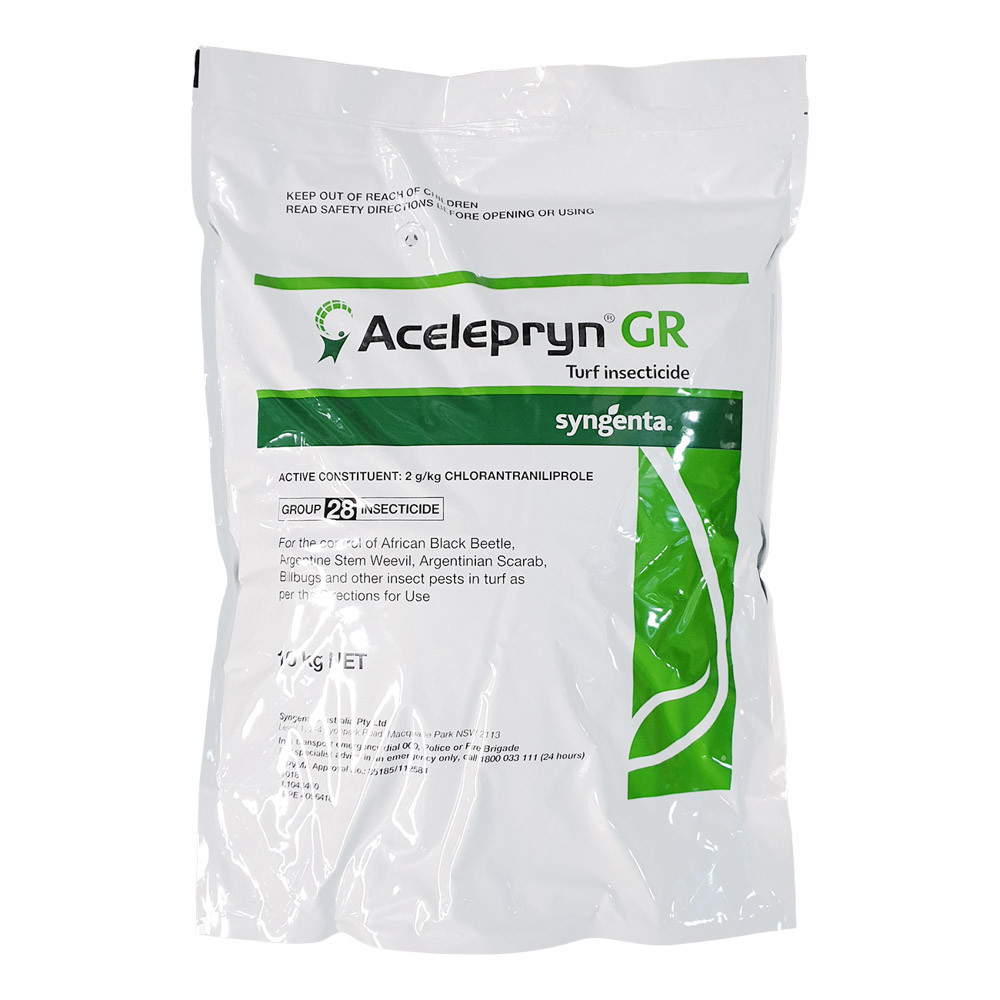Description
THIS PRODUCT: Acelepryn GR Insecticide provides unmatched, season-long grub and caterpillar control convenient and flexible granule formulation.
Acelepryn GR Controls a wide range of insect pests including African Black Beetle, Argentinian Scarab, Billbugs and several species of caterpillars including Cutworm, Sod Webworm and Lawn Armyworm.
The efficiency and longevity of Acelepryn GR’s performance mean your turf spaces are protected for longer and because it is exempt from poison scheduling, and PPE requirements for workers are reduced. This no spray option means ease of use and minimal disruption to the community.
Acelepryn GR sets a new standard in long-lasting, efficient control of turf pests. The granule formulation offers you the same benefits as the liquid you know and trust, such as:
- Granular formulation that is easy to use
- Season long control
- Exemption from poison scheduling
- High turf safety and low environmental impact
In addition, Acelepryn GR delivers:
- A flexible option for tight or difficult to access turf areas such as schools, passive parks and around trees and other obstacles
- Ease of use with no spray equipment, no re-entry periods and no PPE requirements
- Ease of activation with a minimum of 3 mm irrigation
HOW TO USE
- Acelepryn GR is easy to use and can be spread in any professional turf fertiliser spreader
- During application check equipment periodically to ensure distribution remains even and effective
- For optimal control, irrigate with approximately 6 mm of water immediately after application
- Where treating for caterpillars, irrigation and mowing should be delayed for 24 hours
- Application rates from 75 kg/ha to 150 kg/ha (0.75kg to 1.5kg / 100m2)
- Acelepryn GR is a SGN 150
In General: Insecticides in the garden are pesticides specifically formulated to control and manage insect pests that can damage or harm plants, flowers, vegetables, and other cultivated vegetation. These products are designed to target and eliminate a wide range of garden insects while minimizing harm to beneficial insects and non-target species. Here’s a description of insecticides in the garden and their common uses:
Description: Insecticides for the garden come in various formulations, including liquids, dusts, granules, and sprays. They contain active ingredients that are toxic to insects and disrupt their physiology or behavior. These insecticides can be broadly categorized into two types:
- Contact Insecticides: These insecticides work upon direct contact with the insect. They are applied directly to the pests or their feeding areas and can provide quick knockdown of insects present on plants.
- Systemic Insecticides: Systemic insecticides are absorbed by plants and translocated within the plant’s vascular system. Insects feeding on treated plants ingest the insecticide and are subsequently affected. Systemic insecticides can provide longer-lasting protection and target pests that are difficult to reach with contact insecticides.
Uses:
- Pest Control: Insecticides are primarily used in the garden to control and manage a wide range of insect pests. Common garden pests targeted include aphids, caterpillars, leafhoppers, whiteflies, mealybugs, and beetles.
- Protection of Crops: Insecticides help protect crops, vegetables, and fruit-bearing plants from insect damage, which can reduce yields and lower the quality of harvested produce.
- Flower Gardens: Gardeners often use insecticides to protect ornamental flowers and plants from insect pests that can cause aesthetic damage or weaken the plants.
- Fruit Trees: Fruit orchards and fruit-bearing trees are treated with insecticides to prevent infestations by insects that can damage fruit, such as codling moths, apple maggots, and citrus psyllids.
- Vegetable Gardens: Insecticides are applied to vegetable gardens to control pests like aphids, tomato hornworms, and cabbage loopers, which can devastate vegetable crops.
- Lawn Care: Insecticides can be used to control lawn-damaging insects like grubs, chinch bugs, and sod webworms.
- Integrated Pest Management (IPM): Insecticides can be part of an integrated pest management (IPM) strategy that combines various pest control methods, including cultural practices, biological controls, and chemical controls, to manage garden pests sustainably.
- Preventive and Curative Treatment: Insecticides can be applied preventively to protect plants from known pests or curatively when pest infestations are observed.
Overall: When using insecticides in the garden, it’s essential to follow the manufacturer’s instructions for dilution, application rates, timing, and safety precautions. Overuse or improper application can lead to issues like pesticide resistance, harm to beneficial insects, and environmental contamination. Gardeners should also consider using less toxic alternatives when possible, such as neem oil, insecticidal soaps, or biological controls like beneficial insects and nematodes, to minimize the impact on the ecosystem and human health.


